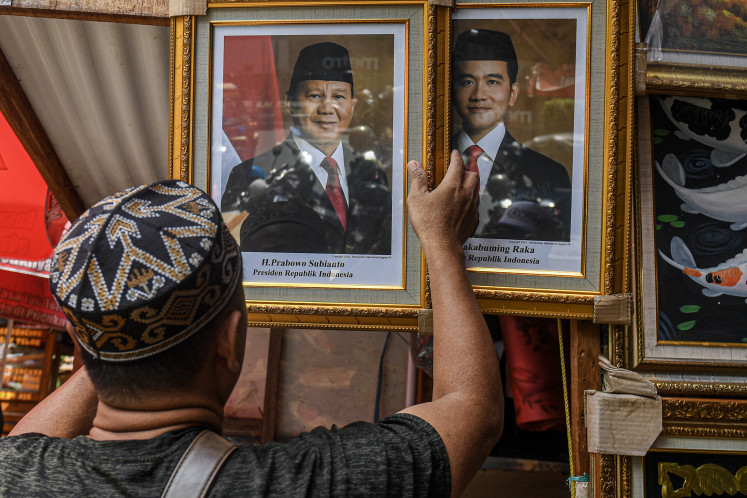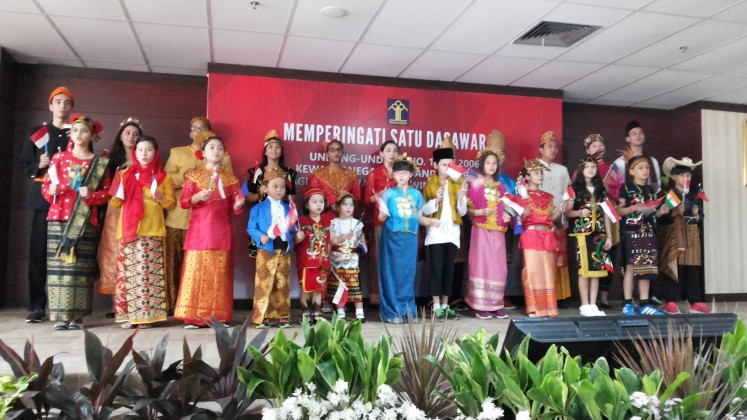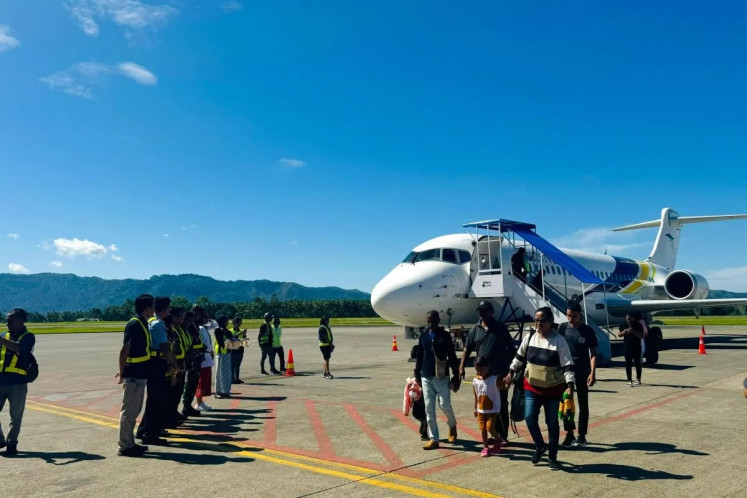Ruling coalition opens door to Prabowo allies
With the presidential election officially coming to an end, political parties may soon continue negotiations on postelection coalitions, which can determine whether incumbent Joko “Jokowi” Widodo will be able to secure more support for his second term
Change Size

With the presidential election officially coming to an end, political parties may soon continue negotiations on postelection coalitions, which can determine whether incumbent Joko “Jokowi” Widodo will be able to secure more support for his second term.
Political parties in Jokowi’s coalition, which secured 54.9 percent of the national vote combined in the legislative election, have expressed their willingness to engage in coalition talks with opposition parties, though analysts said the process might not be a walk in the park.
The Democratic Party and National Mandate Party (PAN), among the four parties backing presidential contender Prabowo Subianto, have hinted that they might depart from the coalition after the General Elections Commission (KPU) announced the final vote tally on Tuesday.
United Development Party (PPP) secretary-general Arsul Sani said the coalition was now waiting for opposition parties who wanted to jump ship to establish their stance.
Though Jokowi had previously engaged with the political bigwigs of PAN and the Democrats, Arsul said the President himself and the parties in the coalition had yet to discuss the possibility of joining hands with them.
“We are not in the position of offering the [opposition] to join us, but we are waiting for them to express their interest,” Arsul said on Tuesday. “We will make our stance after they convey their conditions — like a power-sharing mechanism.”
He acknowledged that Jokowi had secured enough political support from the coalition at the House of Representatives, especially with four parties set to control the House’s five leadership seats, leaving the Gerindra Party as the only opposition party in the shared leadership.
National Awakening Party (PKB) chairman Muhaimin Iskandar also suggested that political parties in Jokowi’s coalition were solid and strong enough to back the government and they first needed to look into the motive of other parties who wanted to join.
“When we are talking about maintaining a stable, strong and productive government, I suppose that we have enough [parties] in our coalition,” Muhaimin said. “We need to make considerations when other parties want to join [the government].”
Unlike Prabowo’s Gerindra Party and its closest ally, the Prosperous Justice Party (PKS), the Democrats and PAN have accepted the KPU’s results and acknowledged that Jokowi had defeated Prabowo with an around 11 percent margin in KPU’s final vote tally.
Democratic Party secretary-general Hinca Pandjaitan has said that a coalition endorsing a presidential candidate was not “an eternal coalition” and that each party had the right to determine its own political trajectory after the election.
“When the competition is over […] then [the coalition] is over,” Hinca said.
PAN chairman Zulkifli Hasan has also said he would support any candidate who legitimately won the election.
Speculation is rife that the Democrats and PAN will jump ship to the ruling coalition, especially after Jokowi held separate meetings with Zulkifli and Democrats patron Susilo Bambang Yudhoyono’s eldest son Agus Harimurti Yudhoyono after the April 17 election.
Obtaining support from the Democrats and PAN might be able to strengthen political support for Jokowi’s government, but analysts have pointed out that the reluctance to accept the two parties in the coalition might be coming from Jokowi’s own coalition.
“There are many parties who have to be involved [in coalition] talks and it will not be easy,” said Adi Prayitno, a political analyst from State Islamic University Syarif Hidayatullah Jakarta.
It might be easier for PAN to join the coalition than it is for the Democrats, given that Yudhoyono had a bitter relationship with ruling Indonesian Democratic Party of Struggle (PDI-P) matriarch Megawati Soekarnoputri, he added.
If the Democrats joined the government, it would reduce the number of ministerial positions that needed to be filled by parties in the ruling coalition, Adi said, adding that Agus, who was touted by many as a potential contender for 2024, might be seen as a threat by some parties.
PDI-P secretary-general Hasto Kristiyanto suggested that “a healthy democracy will consist of [figures] who fought to create a coalition before the presidential election”.









